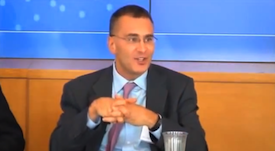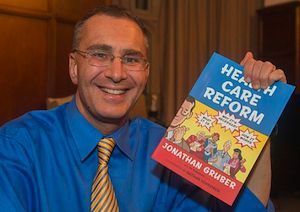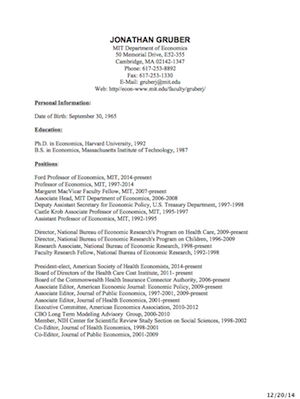Economist Jonathan Gruber gained wide notoriety in November when it seemed that each new day revealed a new video of the MIT professor arrogantly crowing about his uber-insider participation in what he portrayed as deception of “too stupid” American voters and Congress in the effort to get the health care law passed. I think it is fair to say that the “take away” from the Gruber revelations for most people was that one of the “architects” of Obamacare traveled around the country vividly describing the ugly details and even uglier thinking behind the Obamacare monstrosity and plots to shove it through Congress.

Just one of the many videos of Jonathan Gruber sharing truths about Obamacare to friendly audiences.
Above all, he is a vivid illustration of the ugly minds involved. For instance, Gruber’s statements are exactly what many suspected Nancy Pelosi was actually thinking as she infamously said, “We have to pass the bill so you can find out what’s in it,” and what the President was really thinking each time he repeated the mantras, “If you like your insurance, you can keep your insurance, period. End of story,” and “If you like your doctor…you can keep your doctor.”
So the Gruber videos serve mostly as infuriating confirmation. But, Gruber called the wrong people stupid – the majority of Americans saw right through the nonsense. Even the Republicans in Congress were smart enough not to vote for it. It was the reluctant Democrats that he helped deceive, not us. Most of us knew we’d be worse off because of the law, before it passed. Now, people are more focused on how the details of the deception are actually affecting our lives. Very, very many, previously available insurance plans have vanished and been replaced with less coverage or higher costs, or – more likely – both.
So Gruber is infuriating. He’s also either so arrogant or, dare I say it? stupid, or both, as to speak repeatedly as he’s done, while being recorded. So, we get it, right? Is there any point in focusing on the details of what he said or paying any further attention to the man?
Short answer: Yes.
Jonathan Gruber remains a person of interest (pun absolutely intended). The details of what he said, and ongoing events surrounding him are worth noting for immediate and general reasons.
Immediate:
The fight against Obamacare MUST continue – it is an increasing disaster for most Americans. Allowing the thing to collapse – an idea perpetuated by Republican establishmentarians– is wishful thinking or an excuse for inaction. Revelations from and about Jonathan Gruber are highly relevant to this necessary fight.
Gruber’s most important statements stand to impact the outcome of a Supreme Court review of an important part of the health care law likely to be argued this coming March, with a ruling in June. The Gruber statements related to the case have drawn the least amount of attention, so people who care about this issue must let others know. (For an overview of the case, see my recent article, “Obamacare Could Implode: The IRS Rule Supreme Court Case”.)
General:
There are lots of Jonathan Grubers: individual specialists in a given field motivated by some combination of political ideology, monetary enrichment, ego gratification and/or power. Their specialized knowledge is merged with advocacy, sold as authoritative and served up to – often by request of – bureaucrats, appointees and elected officials, who defer and refer repeatedly to their analyses and recommendations when crafting legislation, regulations, and rules at the federal, state, and local levels.
Jonathan Gruber and his counterparts everywhere get paid with your (and your descendants’) tax dollars for providing such “expertise” . Sometimes, they double, triple, and quadruple dip by getting paid by multiple levels of government, multiple agencies via contracts or government grants, for the same work, sometimes simultaneously.
Gruber proves he’s an expert – in undermining himself & Obamacare
For both political and substantive reasons, the Gruber revelations were just screaming for Congressional inquiry and the House Committee on Oversight & Government Reform did request testimony from him. Oversight & Government Reform is the House of Representative’s primary investigatory committee and has broad jurisdiction. It’s supposed to be the government watchdog – our watchdog – especially regarding how government funds are spent and whether government actions are accurately and fully disclosed1The Oversight Committee’s jurisdiction is difficult to succinctly describe adequately. For a better understanding, see the General Printing (now Publishing) Office version of the Committee’s rules or for a shorter version, see the rules document published on the Committee’s website..
I decided to half-listen to the Gruber testimony because I was very curious if there was really any substantive purpose behind the Committee’s request. Was the whole thing just going to be an opportunity for the Republicans to make political hay by subjecting Jonathan Gruber to a public shaming? While public shaming is the least the fellow deserves, Republicans need to talk less unless they’re going to do more.
But, Gruber’s December 9, 2014, hearing appearance demanded more than half attention. Although there was plenty of migraine-inducing babble from too many Democrats and too much time wasted by some Republicans, some Democrats and most of the Republicans were well prepared and focused.
The hearing revealed and/or confirmed that Jonathan Gruber truly did demand scrutiny by the Oversight Committee, because, the news reports and video snippets only scratched the surface:

In addition to advising, consulting, writing journal articles and opinion pieces advocating for and touting Obamacare, Gruber authored a comic book to explain the law. Click the image to read more about the book and see some pages (Also – see Amazon.com listing).
- He has repeatedly and at length made public statements during conference speeches and in television and radio appearances admitting that he was heavily involved in providing misleading and faulty information to federal government agencies, employees, and elected officials in an organized effort with others to deceive in an ultimately successful effort to pass a piece of legislation.
-
He has received government funds, through contracts or grants, directly from federal agencies and departments as well as through state governments using federal government grants in amounts estimated to be between $400,000 and $6 million.
-
He was a member of one Congressional Budget Office (CBO) advisory panel specifically focused on health care policy while contracted with a federal agency (HHS) to provide information to the CBO regarding the health care legislation.
The questions and answers during his testimony revealed that:

A very informative read – Jonathan Gruber’s Curriculum Vitae (current version as of Dec. 2014). Click the document image to view / download
- Jonathan Gruber refused to provide complete disclosure of income he obtained from government contracts and grants to the Committee, despite the requirement to do so and despite repeated requests from Committee members. Gruber responded to such questions by telling Committee members that they “can take that up with my counsel”.
-
Gruber refused to submit copies of all the work he produced as a government-compensated contractor and grant-recipient – materials which are almost always considered government work product – again telling members that they “can take it up with my counsel”.
-
Gruber only enhanced concerns regarding the potential CBO conflict of interest. His answers simply weren’t credible. He refused to give specific dates about his tenure at CBO by claiming he didn’t recall and playing word games, all despite the fact that his own Curriculum Vitae – to this day2Jonathan Gruber’s current Curriculum Vitae is worth reading not only because it provides a wealth of historical information on the economist’s background and his activities, it reinforces what’s obvious in the video, including that the man lacks credibility. In addition to his sudden failures of memory regarding his CBO tenure, Gruber apologized for and used as an excuse his lack of “political expertise” throughout his testimony. His Curriculum Vitae proves that he is an entirely political creature and what sort. Among its seventeen pages, there are two lengthy lists of published articles and essays – and I’m not referencing to his list of published work in academic journals – almost all of which have been for notable left-wing organizations and publications. – gives specific dates of CBO panel membership through 2010 (Barack Obama signed the health care law on March 23, 2010).
The following two videos are, I think, excellent representations of how Jonathan Gruber testified, why he needed to be called to a hearing, and why he should be subjected to further scrutiny:
Questions from Rep. Jason Chaffetz (R, UT):
Question from Rep. Tom Rice (R, SC):
Gruber has no credibility
While there were a number of important revelations pertaining to specific aspects of the health care law during this hearing, my purposes here are to focus on Jonathan Gruber. Mostly, he repeated, ad nauseam, a list of carefully parsed, robotically-rehearsed, and often deliberately vague phrases. Besides the representative videos I’ve included here, he repeatedly gave the following three non-response responses3I realize the term “non-response responses” isn’t great grammar. It was a deliberate allusion to the term “non-denial denial” , generally believed to have been coined during the Watergate era by Washington Post Editor Ben Bradlee. He used the phrase to describe very heavily parsed Nixon administration responses to questions surrounding Watergate. Most White House official responses avoided direct, flat repudiation of allegations, leaving open the possibility that they were true.:
“I don’t recall.”
“I tried to make myself seem smarter by demeaning others.”
“I was being glib.”
His testimony was not credible. Beyond repeating himself robotically, he contradicted himself over and over again to the point of absurdity. For instance, when pressed, he actually said his statements weren’t lies. But, if his statements weren’t lies, why did he label them as inexcusable in his introductory statement? He further destroyed his credibility through repeated claims that prior statements were “conjectures outside my area of expertise”, but then seconds or minutes later, he “conjectured”, firmly on the same subjects, but with an entirely different opinion. Just one such example:
October 2013:
The bill’s “lack of transparency is a huge political advantage.”
December 9, 2014, Testimony:
“I think the Affordable Care Act was passed in a highly transparent fashion.”
Clearly, any “conjecturing”4A common definition of of “conjecture”: “Opinion or judgment based on inconclusive or incomplete evidence,”. I would argue that all Jonathan Gruber has ever done is conjecture about health care policy, considering he is literally the creator and only user of the “micro-simulation model” used as the references for Romneycare and Obamacare. Professor of Economics and Hoover Institution research fellow Paul Gregory fully explains why in an excellent essay, “The Fatal Conceit of Jonathan Gruber”. One quote from the essay: “Professor Gruber must use ‘behavioral assumptions’ to guesstimate, among thousands of other things, how many young people will ignore the mandate, how many employers will drop coverage, and how providers will react to new incentives and compensation schemes.” “outside of his area of expertise” is only inexcusable and inappropriate if that conjecturing undermines the legitimacy of the health care law. Not coincidentally, Gruber was most firm in reversing himself on the very subject that has already damaged the federal government’s argument in a pending court case (related to the IRS rule case).
December 9 hearing not the end
Chairman Darrell Issa truly did give Gruber every opportunity to avoid a repeat appearance and subpoena, urging him to provide “best estimates” of government funds he’d receive and to make a verbal agreement to submit documents later, but, Gruber not only refused, many of his answers just raised more troubling questions.
Chairman Issa made good on his pledge to act. On December 11, 2014, he issued a subpoena for the following (the list below is directly from Issa’s press release):
1. All documents and communications to or from any federal, state, or local government employee, including, but not limited to, any document or communication referring or relating to the Affordable Care Act or federal and state health care exchanges.
2. All documents and communications referring or relating to funding, for research or otherwise, from any federal, state, or local government agency, including, but not limited to, any contract(s) with a federal, state, or local government agency.
3. All documents and communications referring or relating to work product produced to any federal, state, or local government agency, for any purpose, including, but not limited to, the results of any and all economic models or simulations.
“Just one of the many videos…” snapshot of YouTube video on AmericanCommittment’s channel
Public meeting with speaker at podium, public domain
Jonathan Gruber with his comic book, original source, unknown, found at Gatewaypundit and The Shark Tank.
References & Notes
| 1. | ↩ | The Oversight Committee’s jurisdiction is difficult to succinctly describe adequately. For a better understanding, see the General Printing (now Publishing) Office version of the Committee’s rules or for a shorter version, see the rules document published on the Committee’s website. |
| 2. | ↩ | Jonathan Gruber’s current Curriculum Vitae is worth reading not only because it provides a wealth of historical information on the economist’s background and his activities, it reinforces what’s obvious in the video, including that the man lacks credibility. In addition to his sudden failures of memory regarding his CBO tenure, Gruber apologized for and used as an excuse his lack of “political expertise” throughout his testimony. His Curriculum Vitae proves that he is an entirely political creature and what sort. Among its seventeen pages, there are two lengthy lists of published articles and essays – and I’m not referencing to his list of published work in academic journals – almost all of which have been for notable left-wing organizations and publications. |
| 3. | ↩ | I realize the term “non-response responses” isn’t great grammar. It was a deliberate allusion to the term “non-denial denial” , generally believed to have been coined during the Watergate era by Washington Post Editor Ben Bradlee. He used the phrase to describe very heavily parsed Nixon administration responses to questions surrounding Watergate. Most White House official responses avoided direct, flat repudiation of allegations, leaving open the possibility that they were true. |
| 4. | ↩ | A common definition of of “conjecture”: “Opinion or judgment based on inconclusive or incomplete evidence,”. I would argue that all Jonathan Gruber has ever done is conjecture about health care policy, considering he is literally the creator and only user of the “micro-simulation model” used as the references for Romneycare and Obamacare. Professor of Economics and Hoover Institution research fellow Paul Gregory fully explains why in an excellent essay, “The Fatal Conceit of Jonathan Gruber”. One quote from the essay: “Professor Gruber must use ‘behavioral assumptions’ to guesstimate, among thousands of other things, how many young people will ignore the mandate, how many employers will drop coverage, and how providers will react to new incentives and compensation schemes.” |

You must be logged in to post a comment.